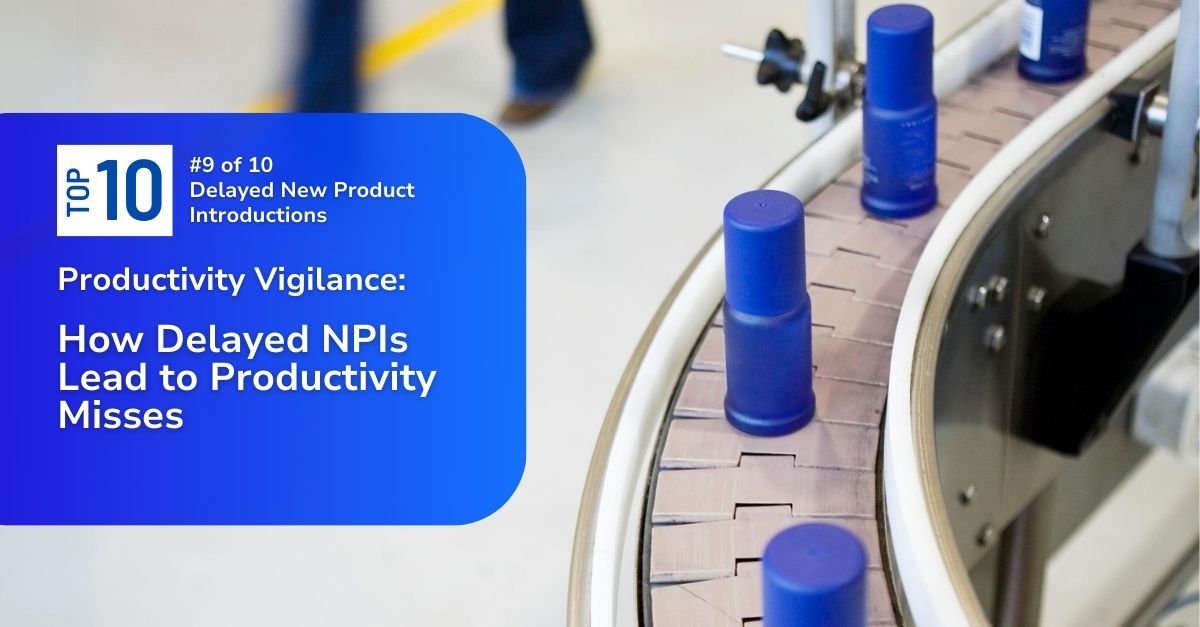
Delayed new product introductions (NPI) pose significant challenges to manufacturing productivity, extending beyond the immediate impact of missed launch dates.
These delays trigger symptoms that disrupt operations on the shop floor, strain relationships with stakeholders, and hamper strategic growth. Each symptom, whether it manifests in strained supplier relationships or negative investor sentiment, ultimately undermines the effectiveness of manufacturing processes.
Consider the less common issue of production scheduling conflicts. When new products are delayed, existing production schedules may need to be adjusted to accommodate the continued manufacture of older products. This can create conflicts in resource allocation, as time and machinery that were earmarked for new product lines must be reallocated to support legacy products. These scheduling conflicts can lead to missed productivity targets, such as underutilized equipment during changeovers and increased lead times, which ultimately disrupt the smooth flow of manufacturing operations and negatively impact productivity.
Addressing the secondary symptoms of delayed NPIs is crucial for maintaining productivity. These symptoms include an erosion of competitive advantage, increased dependency on suppliers for outdated products, and difficulties in integrating old systems with new technologies. They also encompass a loss of trust with key suppliers, negative investor sentiment, fractured relationships with partners, damage to brand reputation, waning consumer interest, missed marketing opportunities, and investor hesitancy. By focusing on these granular issues, manufacturers can develop targeted strategies to mitigate their impact and sustain productivity even when facing delays in new product introductions.
1Erosion of Competitive Advantage and Market Share:
Delays in launching new products erode a company’s competitive advantage, allowing competitors to capture market share. This loss is not just about sales but about positioning within the market. When a company is perceived as a laggard, it struggles to retain its innovative edge, leading to a decline in brand loyalty and market influence. The delay creates a gap that competitors eagerly fill with their products, which can lead to a significant shift in consumer preference and industry dynamics.
Mitigation: To mitigate this, companies should implement agile project management practices. Regular sprints and iterative product development can help in identifying and addressing potential delays early in the process. Additionally, maintaining a robust R&D pipeline ensures continuous product innovation. Leveraging predictive analytics can also provide foresight into market trends, enabling timely adjustments to the NPI schedule.
2Increased Supplier Dependency for Older Products:
As new product launches are delayed, manufacturers are forced to rely on older products to sustain their revenue streams. This increased dependency on legacy products necessitates continued procurement of outdated materials and components, which may no longer be readily available or cost-effective. Suppliers might exploit this dependency, raising prices or demanding long-term contracts that can stifle flexibility and increase costs.
Mitigation: Building strong, diversified supplier relationships can alleviate dependency on any single source. Developing strategic partnerships and negotiating flexible contracts with multiple suppliers can ensure a steady flow of necessary materials. Additionally, investing in supply chain optimization technologies can enhance procurement efficiency and reduce reliance on outdated components.
3Difficulty Integrating Older Systems with New Technologies:
The delay in introducing new products often means that older systems and technologies must remain in use longer than planned. These legacy systems may not integrate well with newer technologies, leading to missed productivity goals and increased maintenance costs. This integration challenge can result in production slowdowns, errors, and higher operational costs as the workforce struggles to bridge the technological gap.
Mitigation: Investing in modular technology solutions can ease the integration of new systems with older ones. Implementing middleware that facilitates communication between disparate systems can also reduce friction. Additionally, continuous training programs for staff on both old and new technologies can ensure smoother transitions and more productive operations.
4Loss of Trust and Potential Termination of Contracts with Key Suppliers:
Delayed NPIs can lead to strained relationships with key suppliers. Suppliers rely on projected production schedules to plan their operations and inventory. When these schedules are disrupted, suppliers can question the reliability of the manufacturer, potentially leading to the termination of contracts or less favorable terms in future negotiations.
Mitigation: Transparent and proactive communication with suppliers about potential delays and their causes can help maintain trust. Collaborative planning and the use of shared forecasting tools can align expectations and minimize disruptions. Establishing contingency plans and buffer stocks can also mitigate the impact of any unforeseen delays on supplier relationships.
5Negative Investor Sentiment Leading to Difficulty Raising Capital:
Investors closely monitor NPI schedules as indicators of a company’s health and potential for future growth. Delays signal potential management and operational inefficiencies, leading to negative sentiment. This can manifest in decreased stock prices, reduced investor confidence, and greater difficulty raising capital for future projects, ultimately constraining growth and innovation.
Mitigation: Clear and consistent communication with investors about project timelines, challenges, and mitigation strategies can help manage expectations. A strong track record of overcoming past delays and showcasing proactive risk management measures can reassure investors. Additionally, diversifying funding sources and maintaining a healthy cash reserve can provide financial stability during periods of uncertainty.
6Fractured Relationships with Partners, Hindering Future Collaborations:
Delays in NPI can strain relationships with business partners, including co-developers, marketing allies, and distribution networks. These partners have their timelines and commitments, and delays can disrupt their operations, leading to frustration and reduced willingness to collaborate on future projects.
Mitigation: Establishing strong, collaborative partnerships with clear communication channels can help manage expectations and mitigate the impact of delays. Joint contingency planning and regular progress updates can foster a sense of shared responsibility and commitment. Recognizing and addressing partner concerns promptly can also help maintain positive relationships.
7Damage to Brand Reputation Through Press Coverage and Social Media Backlash:
In today’s digital age, delays in NPI can quickly become public knowledge, leading to negative press coverage and social media backlash. This damages the brand’s reputation, eroding consumer trust and loyalty. Negative perceptions can be particularly harmful if competitors capitalize on the situation, portraying themselves as more reliable and innovative.
Mitigation: A proactive public relations strategy that includes timely, transparent communication about delays and the steps being taken to address them can help mitigate negative fallout. Engaging with customers and stakeholders through social media and other channels can also demonstrate accountability and commitment to quality. Crisis management plans should be in place to handle any negative press swiftly and effectively.
8Waning Consumer Interest and Decreased Pre-Order Sales:
Delays in launching new products can lead to waning consumer interest, especially if consumers have been eagerly awaiting the product. This can result in decreased pre-order sales and a lackluster launch, further compounding the financial impact of the delay. When consumers lose interest, regaining their attention and enthusiasm becomes challenging.
Mitigation: Keeping consumers engaged through regular updates and exclusive sneak peeks can maintain interest and excitement. Offering limited-time incentives or exclusive bonuses for pre-orders can also boost sales. Leveraging customer feedback to demonstrate ongoing improvements and enhancements can help reassure consumers that the wait will be worth it.
9Missed Opportunities for Product Placement in Major Media Outlets or Events:
Timing is crucial for product placements in major media outlets or events such as trade shows, exhibitions, and industry conferences. Delays in NPI can result in missed opportunities for high-impact marketing and exposure, reducing the product’s visibility and market traction. These missed opportunities can be difficult to recover, leading to slower market adoption.
Mitigation: Aligning product development timelines with key industry events and media opportunities can maximize exposure. Developing a flexible marketing strategy that can adapt to changing timelines ensures that promotional activities remain effective. Building strong relationships with media and event organizers can also provide opportunities for rescheduling or alternative placements.
10Investor Hesitancy and Withdrawal of Financial Backing for the Launch:
Delays in NPI can cause investors to become hesitant or withdraw their financial backing, fearing that the product will not meet market expectations or deliver a return on investment. This withdrawal can result in a lack of necessary funding for the launch and subsequent marketing efforts, creating a vicious cycle of underperformance and further financial strain.
Mitigation: Regular updates and transparent reporting on project progress can help maintain investor confidence. Demonstrating a strong understanding of market conditions and a clear path to overcoming delays can reassure investors of the project’s viability. Additionally, showcasing successful case studies of past projects that overcame similar challenges can provide tangible proof of the company’s capability to deliver.
Navigating the Impact of Delayed NPIs
Delayed new product introductions significantly impact manufacturing productivity, leading to a range of secondary symptoms that disrupt operations and strategic growth. These symptoms, from increased supplier dependency to fractured relationships with partners and negative investor sentiment, present real challenges that managers face daily on the shop floor. For instance, delays can force manufacturers to rely on outdated machinery, leading to higher maintenance costs and increased downtime.
How POWERS Can Help
The POWERS framework provides a structured approach to addressing these productivity challenges. By focusing on proactivity, optimization, productivity goals, resilience, and sustainability growth, POWERS equips managers with the tools and strategies needed to navigate the complexities of delayed NPIs.
POWERS empowers manufacturers to:
- Cultivate Agility: Adapt production schedules and resource allocation to minimize disruptions.
- Strengthen Supplier Relationships: Foster open communication and collaboration for a reliable supply chain.
- Embrace Technological Evolution: Seamlessly integrate new technologies and processes for cutting-edge operations.
- Build Trust and Transparency: Communicate openly with stakeholders to maintain confidence during setbacks.
- Enhance Brand Reputation: Proactively address delays and concerns to foster consumer loyalty.
- Unlock Growth Opportunities: Turn delays into catalysts for innovation and process optimization.
By embracing POWERS, you transform delayed NPIs from productivity pitfalls into opportunities for growth. You empower your workforce, enhance your brand reputation, and ultimately secure your position as a leader in the ever-evolving manufacturing landscape.
- Speak to an Expert: Call +1 678-971-4711 to discuss your specific challenges and goals.
- Email Us: Get tailored insights by emailing info@thepowerscompany.com
- Request an Assessment: Use our online contact form, and one of our expert manufacturing consultants will reach out to schedule an in-depth analysis of your operations.
Continue Reading from this Mastery Series
- Part 1 – Without Top Talent, Top Productivity is Elusive
- Part 2 – How Blind Spots in Cost Analysis Hide Your Productivity Struggles
- Part 3 – When Supply Chain Issues Deliver A Productivity Hit
- Part 4 – Environmental Threats that Threaten Your Productivity
- Part 5 – Don’t Let Scaling Up Bring Down Your Productivity
- Part 6 – How Vulnerabilities to Disruptions Undermine Productivity
- Part 7 – Why Ignoring TPM Means Missing Out on Productivity Goals
- Part 8 – How Poor Training and Development Creates Productivity Shortfalls
- Part 9 – How Delayed NPIs Lead to Productivity Misses
- Part 10 – How Inaccurate Data Obscures Productivity Insight







